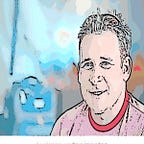So my fellow actors, let’s start with the SMALL words!
The words we throw away.
As actors, we really love those big juicy words. We are geeks at studying those words whose meaning we do not know and we just revel the feeling of that word ‘assassination’ that Shakespeare gives us in this speech! Believe me, now that I am a director, I adore researching and giving actors notes on these words too. Do not even get me into the ‘images’ that these juicy words evoke and the emotional connection they give us as we throw them off our tongue like newly minted coins into our audience’s lap!
But now let us discuss those boring words. Those small insignificant words we just want to hop over like NOW, IF, AND, BUT, OR… ugh, just get me to “discontent”! The truth is, these small words are gold for the actor. What if I told you that these small words set up everything for the actor. They help a director navigate the shape of a scene. They help bring absolute clarity in storytelling to the audience. And they are the crux of revealing a character’s point of view.
#1 The truth is, the small words are of the utmost importance in all drama. Especially the classics and Shakespeare. These small words are the hint of a new thought by the character and a change in their argument! Try lifting the word “If” or coining it a bit harder. Do you now hear you are giving the audience two alternatives? You are setting up the words that follow? Now try it with AND. Now try it with OR. Do you see what I mean? You are leading the audience through the character’s argument…
#2 The small words carry an immense amount of weight. An actor cannot help to go slower on these words (and should!) just as they cannot help to swiftly run over the longer words like ‘assassination’. The fact is it is harder for an audience to understand long words when you move slower on them. But as you trod slowly over these short words, you can guide the audience along with your argument. You can even lift them with a slight pause to perk the ears of the audience so they really hear the important information… “But here,… upon this bank and shoal of time.”
#3 The great writers know how important and powerful small words are. Heck, in Shakespeare it is used when he wants complete naturalism mixed within his rich scaffolding of verse. It always makes me smile when someone says to me “I want to present Shakespeare naturalistic, like everyday talk so that the audience understands it better!”. I am sorry to say Shakespeare is already ahead of you. He knew this very well since he was speaking English like us and not in verse. After all, you can’t get much more naturalistic than “To be or not to be, that is the question”. A moment where he and Hamlet need to be as naturalistic as possible. Then he moves onto that rich scaffolding of “whether ’tis nobler in the mind to suffer the slings and arrows of outrageous fortune”. What an effect that has by sound and power of the mixture of these small words with the long.
As a director, one of the crucial tools I use to break down a text is lifting all the small words in a monologue or scene. For me, they are the clue to the argument and the character’s point of view. They are key in helping me figure out what the character is trying to achieve in the scene. It is the key to their motivation and intention. But they are also the key that will help me guide the actor in the clarity of the storytelling for the audience. It helps me support the actor in lifting certain words or phrases the audience must hear/follow in our interpretation of the playwright’s script.
For actors, this is the key to everything. Next time, try taking that boring commercial script for Wal-Mart and extracting the small words. If you can start finding the power and control in your message through them, you will stand out in front of a thousand other actors. When it comes to great scripts and dialogue, it is crucial to the actor’s work.
